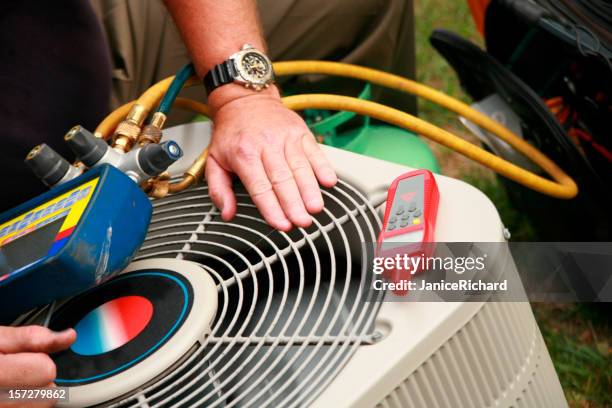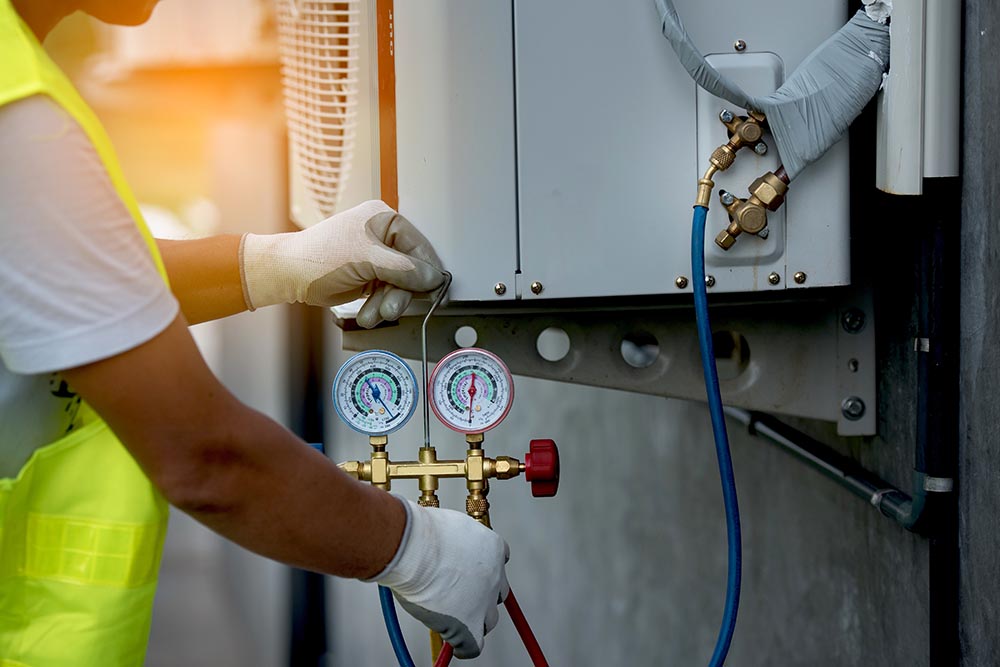Things to Know Before Your heat pump replacement ooltewah tn Starts
Things to Know Before Your heat pump replacement ooltewah tn Starts
Blog Article
Selecting In Between a Heatpump and Furnace: Secret Considerations for Your Cooling And Heating Needs
When assessing heating choices for heating and cooling requires, the choice in between a heatpump and a heater can be complicated. Each system provides distinct benefits tailored to details climates and energy performance goals. Comprehending these differences is essential for making an informed option. Trick elements such as installment expenses and ecological effect better complicate the option procedure. Which alternative really straightens with one's comfort and sustainability choices? The complying with sections will certainly discover these considerations thoroughly.
Understanding Warmth Pumps: Exactly How They Work and Their Advantages
While numerous house owners think about different home heating choices, comprehending how heatpump function and their benefits can greatly affect their choice. Heatpump operate by moving heat instead of producing it. In the winter season, they extract warmth from the outside air or ground and move it inside, while in the summertime, they reverse this process, cooling down the home by eliminating warm outside. This twin capability makes them functional for year-round climate control.One of the key benefits of heatpump is their power performance. They use substantially much less electricity contrasted to standard heater, possibly leading to lower energy bills (furnace replacement). In addition, warmth pumps have a smaller sized carbon impact, making them an ecologically friendly selection. They likewise need much less upkeep than standard systems, contributing to long-lasting expense financial savings. In general, recognizing the auto mechanics and benefits of heatpump can assist property owners make notified decisions concerning their home heating and cooling down requirements
Checking Out Furnaces: Kinds, Procedure, and Benefits
Heating systems can be found in numerous types, including gas, electric, and oil designs, each with unique operational mechanisms. Comprehending these differences is crucial, as they impact performance and heating performance. In addition, heaters supply various benefits, such as consistent heat output and dependability in colder climates.
Types of Heaters
Heating unit can differ considerably in design and procedure, with heating systems being a popular option among home owners. There are several kinds of furnaces, each utilizing different gas sources and modern technologies. Gas furnaces are usual, leveraging gas to create warmth successfully. Electric heating systems, on the various other hand, utilize electric resistance to produce warmth, often preferred for their straightforward installation. Oil furnaces, while less typical, work in locations with minimal gas gain access to (heat pump installation ooltewah tn). Furthermore, condensing furnaces maximize power performance by capturing and recycling exhaust gases. Each kind runs via a system of warm exchangers and ductwork to distribute warm air throughout a home. Comprehending the differences between these heating system kinds is essential for notified cooling and heating decisions
Benefits of Heaters
For property owners looking for dependable heat during chilly months, the advantages of heating systems are significant. Furnaces supply constant heating, making certain also temperatures throughout the home. They are especially effective in severe cool, typically outperforming warm pumps in icy problems. Various types, consisting of gas, electrical, and oil furnaces, supply adaptability to meet varied demands and preferences.Furnaces also often tend to have reduced initial setup expenses compared to heatpump, making them a much more obtainable choice for several. Their robust design adds to a much longer life-span, with several systems lasting over 15 years with appropriate upkeep. Additionally, modern-day heating systems are frequently furnished with sophisticated modern technology for boosted performance, which can bring about lowered energy bills. On the whole, furnaces continue to be a dependable option for effective home heating.

Power Effectiveness: Contrasting Warm Pumps and Furnaces
When comparing power efficiency in between heatpump and furnaces, the Seasonal Power Effectiveness Proportion (SEER) plays an important duty in establishing efficiency. Additionally, an operational price analysis discloses the long-lasting economic ramifications of each system. Recognizing these factors can direct property owners in making notified choices regarding their home heating services.
Seasonal Power Efficiency Ratio
Energy performance plays an important role in the decision-making process between heat pumps and heaters, specifically when thinking about the Seasonal Energy Efficiency Ratio (SEER) This statistics actions the cooling performance of heatpump over a whole cooling season, providing a standard method to review performance. Greater SEER rankings suggest better energy efficiency, equating to lower power usage and lowered energy expenses. On the other hand, heating systems are commonly evaluated utilizing the Annual Fuel Usage Effectiveness (AFUE) score, which shows heating efficiency. When comparing these two systems, homeowners ought to prioritize SEER rankings for heatpump, as they directly impact overall energy savings and ecological sustainability. An extensive understanding of SEER can significantly affect the long-term contentment and cost-effectiveness of the chosen HVAC solution.
Operational Cost Analysis
Understanding the functional prices related to heat pumps and heating systems is important for property owners examining their options. Heatpump typically offer greater energy efficiency, converting electric power right into warm with very little waste. This causes reduced monthly utility bills, specifically in moderate climates. Alternatively, conventional heaters, specifically gas designs, may have lower upfront expenses but can sustain greater operational expenditures over time because of sustain costs and performance ratings.Moreover, heatpump can function as both home heating and cooling systems, potentially decreasing the demand for different HVAC systems. While preliminary financial investments for heatpump might be greater, their lasting financial savings in energy performance can make them a much more economical selection for numerous homes. Mindful analysis why not look here of local power rates is important to establish the most effective alternative.
Installment Costs: What to Expect for each and every Furnace
Installation expenses for heating unit can differ substantially in between heatpump and furnaces, influencing home owners' choices. Warm pumps normally have greater ahead of time installment expenses, usually ranging from $3,500 to $8,000, depending upon the unit dimension and complexity of installment. This includes the outside device, indoor handling system, and essential ductwork adjustments. On the other hand, furnaces often tend to have lower first costs, balancing between $2,500 and $6,000, which can be appealing for budget-conscious property owners. Setup costs can increase if considerable ductwork is required.Moreover, the option of gas type for heating systems-- natural gas, propane, or electric-- can likewise influence installment costs. While heatpump provide power efficiency, their initial investment may discourage some purchasers. Inevitably, evaluating installment expenses alongside long-lasting savings and efficiency will certainly assist homeowners in making notified choices about their heating unit.
Environment Factors To Consider: Which System Executes Much Better in Your Area
How do environment conditions influence the performance of heater? The efficiency of heat pumps and heating systems can differ greatly relying on the local climate. In modest climates, heat pumps succeed by efficiently moving warmth from the outside air, making them an energy-saving alternative. Their effectiveness lessens in incredibly cold temperature levels, where they may have a hard time to extract enough warmth. Conversely, furnaces, particularly gas versions, supply constant and trusted heat no matter exterior problems, making them better in colder regions.In locations that experience milder wintertimes, heatpump can operate efficiently year-round, giving both cooling and heating. On the other hand, areas with extreme wintertimes usually profit from the robustness of heaters. Inevitably, understanding the local environment is crucial when determining between a heatpump and a heater, as it straight influences their operational effectiveness and general efficiency.
Maintenance Demands: Long-Term Treatment for Warmth Pumps vs. Furnaces
While both heatpump and furnaces call for normal maintenance to ensure peak performance, their certain demands and treatment routines vary substantially. Heating systems normally need much less regular focus, with yearly assessments being adequate to look for gas leaks, tidy filters, and evaluate overall performance. Their less complex style usually enables straightforward repairs.In contrast, warmth pumps require semiannual upkeep because of their double function in home heating and cooling. This consists of cleansing coils, examining refrigerant degrees, and guaranteeing that both the outside and indoor units function at their best. In addition, heatpump maintenance commonly entails even more detailed components, making professional maintenance essential.Neglecting maintenance can bring about diminished efficiency and enhanced energy costs for both systems. Ultimately, home owners ought to consider these lasting treatment requirements when selecting in between a heat pump and a heater, heat pump service as aggressive upkeep can expand the lifespan and performance of either system significantly.
Ecological Impact: Selecting a Sustainable Heating Choice
The ecological influence of furnace is a crucial examination for home owners looking for lasting choices. Heatpump are usually a lot more energy-efficient than traditional heaters, as they move heat as opposed to create it, considerably decreasing carbon emissions. By making use of renewable resource resources, such as air-source or geothermal heatpump, property owners can better reduce their eco-friendly footprint.On the various other hand, all-natural gas heaters discharge greenhouse gases and add to air contamination, though they frequently supply higher warmth outcome. Nevertheless, advancements in innovation have brought about the growth of high-efficiency heating systems that decrease emissions.Ultimately, choosing a furnace involves evaluating performance versus environmental effect. House owners are see here now motivated to show on regional energy sources and rewards for eco-friendly systems, ensuring a choice that lines up with both personal convenience and environmental obligation. The decision influences not just instant comfort but additionally lasting sustainability and environmental health.
Regularly Asked Questions
The Length Of Time Do Warmth Pumps and Furnaces Commonly Last?
The life-span of warm pumps commonly varies from 15 to 20 years, while heaters can last in between 15 to 30 years. Routine maintenance significantly affects their durability and efficiency in providing heating remedies.
Can I Make Use Of a Heat Pump in Exceptionally Cold Climates?
Heatpump can run in very cool climates, however their performance diminishes as temperatures decline. In such problems, supplemental home heating sources might be required to maintain comfy indoor temperatures and guarantee peak performance.

What Is the Noise Degree of Warmth Pumps Versus Furnaces?
The sound degrees of heatpump and heating systems vary significantly. Typically, heatpump run even more silently than conventional furnaces, making them preferable for those sensitive to seem, while heaters may create louder functional sounds during heating cycles.
Are Warm Pumps Suitable for Both Heating & Cooling?
Heatpump are without a doubt ideal for both cooling and heating (heat pump installation ooltewah tn). They operate by transferring heat, supplying effective temperature level control year-round, making them a functional option for house owners looking for an all-in-one heating and cooling solution
What Size Heater Do I Need for My Home?
Identifying the suitable size furnace for a home needs reviewing variables such as square video footage, insulation high quality, neighborhood climate, and the home's layout. Consulting a professional can ensure a precise analysis and suitable convenience. Warmth pumps generally provide higher energy performance, transforming electrical energy right into warm with minimal waste. In moderate environments, warmth pumps excel by effectively transferring warm from the outdoors air, making them an energy-saving option. Conversely, heaters, specifically gas models, offer consistent and dependable heat no matter of exterior problems, making them preferable in cooler regions.In areas that experience milder winter seasons, heat pumps can run successfully year-round, providing both heating and air conditioning. Heat pumps are usually more energy-efficient than conventional furnaces, as they move warmth rather than create it, significantly reducing carbon emissions. By utilizing sustainable energy sources, such as air-source or geothermal warm pumps, property owners can additionally minimize their eco-friendly footprint.On the other hand, natural gas heating systems produce greenhouse gases and add to air contamination, though they usually give greater warmth output.
Report this page